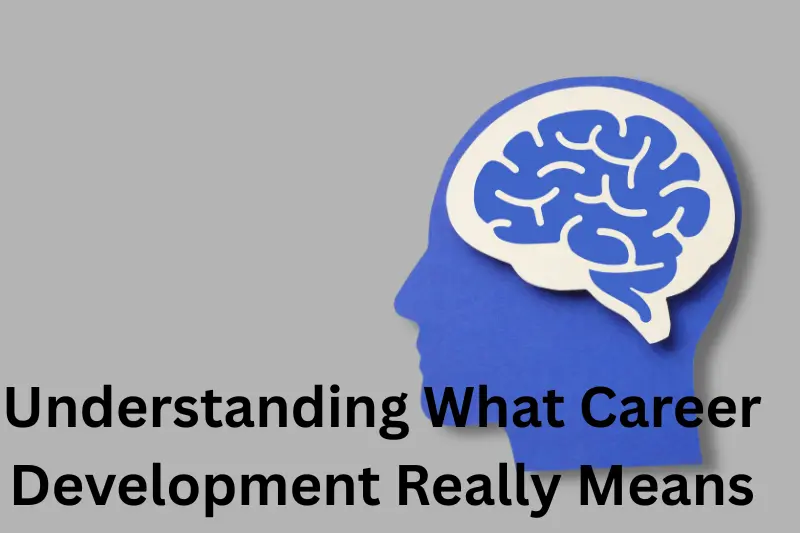Let’s be honest—career growth isn’t always a straight line. There are moments when you feel like you’re moving forward, and then suddenly, you hit a wall. You might be in a job that feels comfortable but not fulfilling, or you’re just starting out and wondering how to find the right path. Maybe you’re doing everything “right” but still feel unseen or unappreciated. The truth is, most professionals go through these phases, and it’s perfectly normal. Career development isn’t something that happens overnight or by luck—it’s something you build with intention, strategy, and consistency. So, let’s have a real chat about the best career development strategies that can help you take control of your future. No fancy jargon, no unrealistic advice—just honest, beginner-friendly insights you can start using today.
Understanding What Career Development Really Means

When people talk about career development, many immediately think about promotions, bigger paychecks, or fancy job titles. But in reality, career development goes much deeper than that. It’s the continuous process of learning, growing, and aligning your professional goals with who you are and what you value. It’s about making conscious choices that move you toward a fulfilling career, not just a paycheck. True career development is about self-awareness, adaptability, and resilience. It’s the art of shaping your path in a way that not only brings success but also satisfaction. In short, it’s about designing a career that fits your life—not the other way around.
Career development also looks different for everyone. For one person, it might mean climbing the corporate ladder and managing a large team. For another, it could be about mastering a skill, becoming an expert in their craft, or even starting their own business. What’s important is that your definition of success matches your personal goals. Once you understand this, you’ll realize that career development isn’t a competition—it’s a personal journey of growth.
Knowing Yourself is the First Step
Here’s the deal—before you can develop your career, you have to know yourself. This might sound simple, but self-awareness is one of the most underrated career skills. Without it, you might end up chasing goals that don’t actually make you happy or working in environments that don’t suit your strengths. Take time to reflect on what you truly enjoy, what drains your energy, and where your natural talents lie. Think about the moments when you’ve felt most proud of your work. What were you doing? Who were you working with? What skills were you using? These clues can help you understand your professional identity and make better career choices.
A good exercise is to write down your top strengths, your biggest weaknesses, and your most meaningful achievements. Then, think about what kind of career path aligns with those qualities. The goal isn’t perfection—it’s clarity. Once you know your unique combination of skills and values, you’ll find it much easier to make decisions that move you closer to your ideal career.
Setting Goals That Actually Work

We’ve all heard people say, “set goals,” but the truth is, most people don’t do it effectively. Writing down vague goals like “I want to be successful” doesn’t help. What does success mean to you? How will you know when you’ve achieved it? The best goals are clear, actionable, and measurable. This is where the SMART framework comes in: Specific, Measurable, Achievable, Relevant, and Time-bound. It helps you turn abstract dreams into concrete actions.
For instance, instead of saying, “I want to improve my career,” you might say, “I want to complete a leadership course within three months” or “I’ll improve my presentation skills by volunteering to lead two meetings this quarter.” These goals give you direction and motivation. And here’s something important—small goals matter. Big success is built on small, consistent actions. Even taking one small step every week toward your goal can create huge results over time. The key is to stay consistent and track your progress.
You may also like to read these articles
Unlock Your Potential with the Best Skill Development Courses Online
Unlock Your Potential with Practical Skill Development Programs
Unlock Future Success with Skill Development for Students
Transform Your Career with Expert Professional Skill Building Tips
Unlock Your Confidence: how to improve communication skills Fast
Learning Never Stops
Here’s some real talk: your degree or your first job title doesn’t guarantee lifelong success. The professional world evolves constantly, and if you stop learning, you risk falling behind. The best professionals treat learning as a lifelong habit. But learning doesn’t always mean sitting in a classroom or enrolling in another expensive course. It can come in many forms—reading books, watching online tutorials, listening to industry podcasts, or finding a mentor who shares their experiences.
Every new skill you learn adds value to your career toolbox. Whether it’s improving your communication skills, staying updated with new technologies, or understanding business trends, continuous learning keeps you adaptable and relevant. It also boosts your confidence, because when you know more, you can contribute more. If you’re not sure where to start, identify areas where you feel less confident and focus on improving those. Remember, learning doesn’t just build your career—it strengthens your mindset.
Building the Right Network
Let’s be real—your skills matter, but your relationships often determine how far those skills can take you. Building a strong professional network is one of the most powerful career development strategies you can have. But let’s clear this up: networking isn’t about collecting business cards or adding random people on LinkedIn. It’s about creating meaningful connections based on trust and mutual value.
Start by reaching out to people who inspire you or work in fields you’re curious about. Attend workshops, industry events, or online meetups where professionals gather. Don’t be afraid to introduce yourself and ask questions. Networking is about learning, sharing ideas, and building long-term professional friendships. And when you offer value—like helping someone solve a problem or sharing useful information—you’ll find that people naturally want to help you too.
Your network can become one of your biggest assets. It can open doors to job opportunities, partnerships, and mentorships you might never have discovered on your own. Remember, every successful person had help along the way—and your network can be that bridge for you.
Developing Soft Skills That Matter
You can have the best technical skills in the world, but if you can’t communicate, collaborate, or adapt, you’ll hit a ceiling. Soft skills—like emotional intelligence, leadership, teamwork, and time management—are what turn good professionals into great ones. Employers consistently say they value people who can work well with others, handle challenges gracefully, and think critically.
Improving soft skills takes self-awareness and practice. For example, if you struggle with communication, challenge yourself to speak up more in meetings or practice active listening. If you want to be a better leader, start by understanding your team’s strengths and helping them succeed. The great thing about soft skills is that they apply everywhere—in any job, industry, or level. They’re the foundation of strong relationships and successful collaboration.
Embracing Change and Flexibility
Change is the only constant in today’s world. Industries evolve, technologies shift, and job markets transform faster than ever. Instead of fearing change, learn to embrace it. Flexibility is a critical skill for long-term career success. When you’re open to new experiences, you expand your horizons and discover unexpected opportunities.
Maybe your industry is becoming more digital, or maybe you’re being asked to take on responsibilities outside your comfort zone. Instead of resisting, see it as a chance to learn and grow. Professionals who adapt easily to change often find themselves leading the way, not following it. Flexibility also helps you stay resilient during setbacks. When you can adjust your plans and stay positive, you turn obstacles into stepping stones.
The Power of Mentorship
Here’s the truth—no one achieves career success completely alone. Having a mentor can fast-track your growth like nothing else. A mentor is someone who’s been where you are, understands the challenges you face, and can guide you with real-world wisdom. They can help you avoid common mistakes, challenge your thinking, and connect you to new opportunities.
Finding a mentor doesn’t have to be formal. It could be a manager, a colleague, or even someone you admire online. The key is to approach mentorship with respect and curiosity. Ask thoughtful questions, seek honest feedback, and apply the advice you receive. Mentorship isn’t about being handed success—it’s about learning how to build it.
Taking Ownership of Your Career
Here’s the final truth bomb—no one cares about your career as much as you do. Waiting for your boss or your company to chart your path is a mistake. You have to take ownership of your professional journey. That means being proactive, not reactive. Seek opportunities instead of waiting for them to find you. Ask for feedback, take on challenges, and advocate for yourself when you’ve earned it.
Taking ownership also means accepting responsibility when things don’t go as planned. Every setback is a lesson in disguise. Instead of viewing failure as a dead end, see it as feedback. Successful professionals aren’t the ones who never fail—they’re the ones who keep learning and moving forward.
Conclusion: Building Your Path, Your Way
So here’s the bottom line—career development isn’t a one-time project; it’s an ongoing process of growth, learning, and self-discovery. The more you invest in yourself, the stronger your foundation becomes. The world of work will keep changing, but if you have clarity, adaptability, and persistence, you’ll always find your way. Your journey might look different from others, and that’s perfectly fine. The only comparison that matters is who you were yesterday versus who you are today.
best career development strategies aren’t about quick wins—they’re about sustainable growth, confidence, and fulfillment. So start where you are, use what you have, and keep moving forward.
Quick Takeaway Checklist:
- Reflect on your strengths, values, and passions.
- Set SMART goals and track your progress.
- Keep learning and upgrading your skills.
- Build authentic connections and seek mentorship.
- Embrace change and take ownership of your journey.
FAQs
What are the best career development strategies?
The best career development strategies include setting clear goals, improving soft skills, networking, continuous learning, and seeking mentorship.
How can I create a career development plan?
Start by identifying your strengths, setting short and long-term goals, finding resources to upskill, and tracking your progress regularly.
Why is career development important?
Career development helps you stay competitive, boosts confidence, and opens doors to better job opportunities and higher satisfaction.
How often should I update my career goals?
It’s best to review and adjust your career goals every six months to ensure they align with your current skills, interests, and job trends.
Can career development strategies help me switch careers?
Yes, applying effective career development strategies can guide you through skill upgrades, networking, and transition planning for a new career path.





